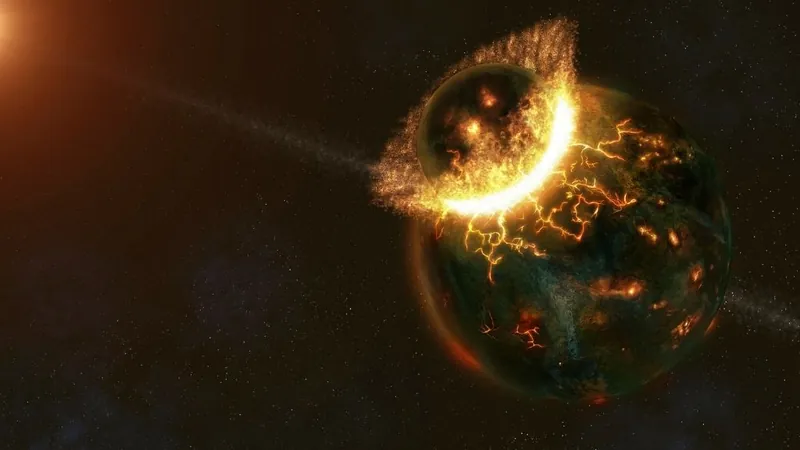
Was a Cataclysmic Crash the Key to Life on Earth? New Studies Say Yes!
2025-08-29
Author: Nur
A Barren Wasteland Transformed
Imagine a time when Earth was just a desolate wasteland, barren and lifeless. Astonishingly, new research suggests this changed due to a monumental collision with a neighboring protoplanet, unlocking the essential ingredients for life!
Meet Theia: The Cosmic Deliverer
Dubbed Theia, this Mars-sized body is theorized to have collided with the proto-Earth over 4 billion years ago. This cataclysmic event not only led to the formation of our Moon but may have also transported vital life's building blocks to our planet.
Study lead author Pascal Kruttasch, a researcher from the University of Bern, shares insights from this ground-breaking study. He highlights that Theia likely originated from the outer solar system, rich in volatile compounds crucial for life, like hydrogen and carbon.
Volatiles: The Building Blocks of Life
These volatiles are more than just gases. They are the fundamental components from which life as we know it springs. Closer to the sun, temperatures soared too high for these materials to condense, leaving them abundant further out in the solar system, especially around gas giants like Jupiter.
A Detailed Look at Earth's Early Years
Using advanced chemical models, the research team scrutinized isotopes from both meteorites and Earth rocks. They focused on the radioactive decay of a manganese isotope that existed in the early solar system, allowing them to track Earth's initial 15 million years meticulously.
Kruttasch emphasizes the mystery surrounding how Earth became a cradle for life: "It is unclear what processes enabled Earth to sustain life for billions of years, as we know of no other planet that has done so.”
The Evolution of the Solar System
The study revealed fascinating dynamics in the early solar system. As nearby planetary bodies exchanged dust and gas, those that formed closer to the sun, like Mercury and Venus, were left with fewer volatile elements due to the high temperatures. Therefore, the life-giving materials must have come from a significant source like Theia.
Implications for Life Beyond Earth
These findings could reshape our understanding of life on exoplanets. The research suggests that for planets resembling Earth, the presence of volatiles is not guaranteed, raising concerns about how likely life is to exist in the galaxy.
Co-author Klaus Mezger warns, "This study makes it clear that life-friendliness in the universe is anything but guaranteed."
Recent Discoveries About Water's Origins
As if this cosmic drama wasn't captivating enough, another study slated for publication suggests that Theia may have also delivered substantial amounts of water to Earth, now possibly hidden within our planet's mantle.
Geologists are puzzled by this discovery; water should have migrated to the surface but appears to have been trapped deep inside Earth since its formation. According to researcher Pedro Machado, the evidence indicates that Theia was instrumental in providing our planet with the water we currently possess.
A Pivotal Moment in Earth's History
The implications of these studies are monumental, shedding light on the origins of life on Earth and the conditions necessary for life to thrive. This remarkable journey from a lifeless rock to a vibrant planet is a cosmic tale that continues to unfold!


 Brasil (PT)
Brasil (PT)
 Canada (EN)
Canada (EN)
 Chile (ES)
Chile (ES)
 Česko (CS)
Česko (CS)
 대한민국 (KO)
대한민국 (KO)
 España (ES)
España (ES)
 France (FR)
France (FR)
 Hong Kong (EN)
Hong Kong (EN)
 Italia (IT)
Italia (IT)
 日本 (JA)
日本 (JA)
 Magyarország (HU)
Magyarország (HU)
 Norge (NO)
Norge (NO)
 Polska (PL)
Polska (PL)
 Schweiz (DE)
Schweiz (DE)
 Singapore (EN)
Singapore (EN)
 Sverige (SV)
Sverige (SV)
 Suomi (FI)
Suomi (FI)
 Türkiye (TR)
Türkiye (TR)
 الإمارات العربية المتحدة (AR)
الإمارات العربية المتحدة (AR)